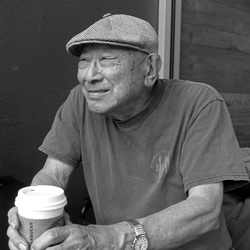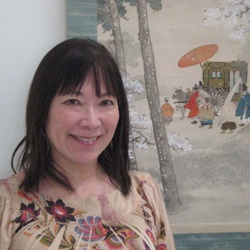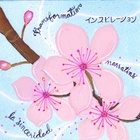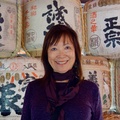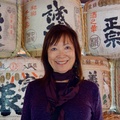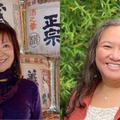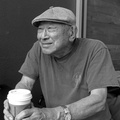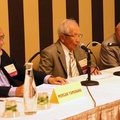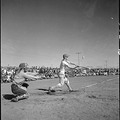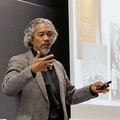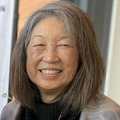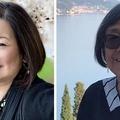For the column’s inaugural post, we wanted to begin with the theme of place, location, and community and to highlight two veteran poets—Hiroshi Kashiwagi, Nisei poet based in San Francisco since 1962, and Amy Uyematsu, Sansei poet and native Angeleno. We are excited to begin with two writers who dedicate much of their creative focus and livelihood to poetry and who have had an influence on so many. Cheers to what their poetry uncovers…
—traci kato-kiriyama
* * * * *
Born in Sacramento in 1922, writer and actor Hiroshi Kashiwagi was incarcerated at Tule Lake Segregation Center during World War II. His publications include Swimming in the American: A Memoir and Selected Writings, winner of American Book Award, 2005; Shoe Box Plays; Ocean Beach: Poems; and Starting from Loomis and Other Stories.
SHUNGIKU
edible chrysanthemum
from the garden
I bite it thoughtfully
and the mint taste
spins time and distance
until I’m face to face
with my Yamato origin
AT TUOLUMNE
The lights go out in the tents,
And the daytime noises cease.
Beyond the tips of the pointed trees,
I can see the night sky.
It is warm inside the sleeping bag.
Tuolumne River is louder at night.
Soon there is only the sky, the trees,
the river and a man in a sleeping bag.
In the morning,
I wake up to the caress of
pine needles on my face and hair.
TULE LAKE MONUMENTS
Castle Rock and Abalone Mountain
and the dry lake bed where tules grow
are timeless, immutable monuments
that bear witness to our confinement
they know and remember for us
the history of our sorrow
dust storms
frequent
powerful
relentless
we endured
we survived
our spirits
unyielding
ultimately
triumphant
OCEAN BEACH
I like
the smell
when I get off
the bus
like the taste of
octopus
of course
it’s the sea
and I know
I’m home
* The poems above are copyrighted by Hiroshi Kashiwagi.
* * * *
Amy Uyematsu is a Sansei poet and high school math teacher from Los Angeles. She has five published collections: Basic Vocabulary (Red Hen Press, 2016), The Yellow Door (Red Hen Press, 2015), Stone Bow Prayer (Copper Canyon Press, 2005), Nights of Fire, Nights of Rain (Story Line Press, 1998), and 30 Miles from J-Town (Story Line, 1992). Her work can also be seen in many anthologies and literary journals. Currently she teaches a creative writing class at the Far East Lounge for the Little Tokyo Service Center.
30 MILES FROM J-TOWN
1
dad was a nurseryman
but didn’t know that sansei
offspring can’t be ripped
from the soil
like juniper cuttings.
2
we were fast learners
we spoke with no accent
we were the first to live
among strangers
we were not taught to say
ojichan, obachan
to grandparents
we were given western
middle names
we collected scholarships
and diplomas
we had a one word japanese
vocabulary:
hakujin
meaning: white
it became my dictionary.
3
and in the summer when
girlsmooth cheeks turn mexican brown
we were given the juice of a lemon
an old country notion, its sting should return
us to our intended feminine selves
4
if you’re hip in l.a. you eat
sashimi at least
once a month you know
the difference between
fresh and saltwater eel you cultivate
a special relationship with one
sushi chef you call
each other by first names-san.
as for me
I had sashimi on hot august nights
steaks grilled rare, 5 cups steamed gohan,
maguro never mushy sliced thick red,
and while the tongue burns sweet
from the mustard of wasabi,
mom brings in wedges
of moist chocolate cake
for cooling.
5
they didn’t force the usual
customs on us.
no kimonoed dolls in glass cases
no pink and white sashes
for dancing the summer obon
we weren’t taught the intricacies
of folding gold and maroon squares
into crisp winged cranes, but
we never forgot enryo
or the fine art of speaking
through silences.
6
every two or three years america goes asia exotic
rising sun t-shirts and headbands
rock stars discover geishas and chinagirls
and asian american women become more desirable
in fashion
almost a status symbol in some circles
be careful it doesn’t go to our heads
in videos blond hero always rescues us from yellow man.
7
quickchange sansei
we can talk cool whether we’re from
southcentral lincoln heights or the flats
and even when we’re not
we can say a few pidgeon phrases
a crude japanese english
offered to grandparents
before they die,
we can fool
sound just like an american
over the phone,
and in public places
we usually don’t talk at all.
8
on important occasions
dad drove us into j-town
through the eastside barrio
past the evergreen cemetary
his sister and brother
never knew manzanar
kanji and english inscribed
on their gravestones
then over the first street bridge
into nihonmachi
this was the center
this was the lifeline
9
I go to japanese movies
whenever they come to town
curious I see few and fewer like me
there are muscular young black men
and white men with indoor complexions
some don’t even need subtitles
but they cannot know
I have to be here
I must spend these three hours
with faces voices
warriors farmers lovers
I would know
and to my soul
these quivering notes
of the shakuhachi
melodies I have heard long ago
10
grandma morita had no time
to learn how to drive the machine
but she took us by bus
to woolworth’s
a dollar each to buy treats
for two girls who could never
talk to her about dreams.
* This poem was originally published in 30 miles from J-town in 1992
and copyrighted by Amy Uyematsu.
THE WELL
Imagine a mountain whose name is heart.
At the throat of the mountain
they fill a well
with so many stones
it can hold nothing more.
They’d never heard of
the mountain named heart,
Kokoro-yama, til they were taken
as prisoners to Heart Mountain.
Imagine a heart big enough to be called mountain.
A mound of stones,
too many to count, remain—
each inscribed
by a different hand,
each crying out.
Some simply reveal
the writer’s name—
Shizuko, a woman,
or a family known as Osajima.
Most of the handpainted
rocks carry a single kanji—
snow wind cold sky
shame home bird.
—For the 12,000 Japanese Americans
interned at Heart Mountain, Wyoming
* This poem was originally published in Nights of Fire, Nights of Rain in 1998 and copyrighted by Amy Uyematsu.
© Hiroshi Kashiwagi; © 1992 & 1998 Amy Uyematsu




